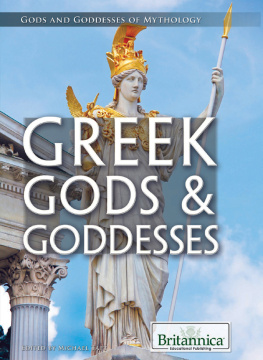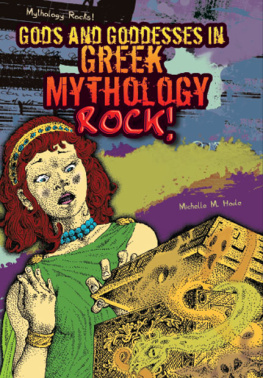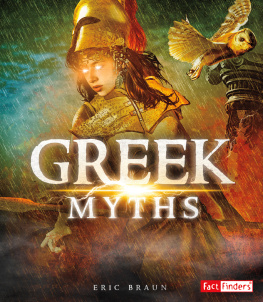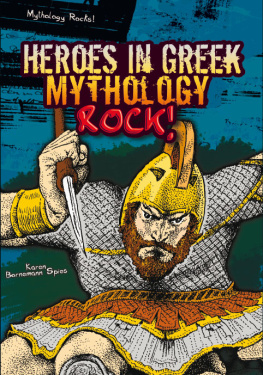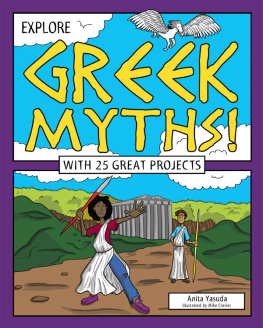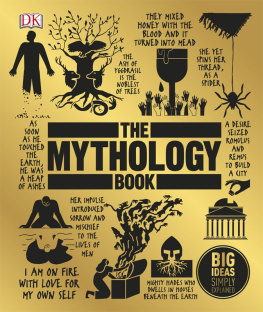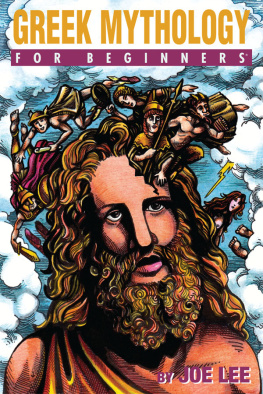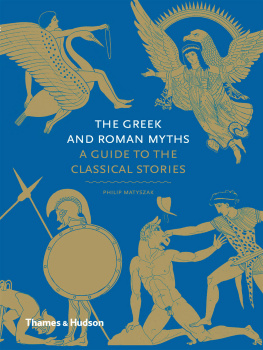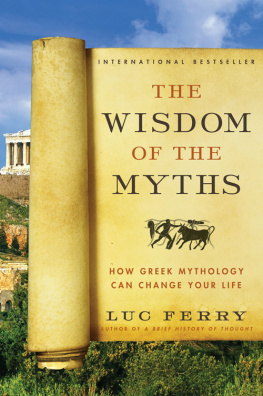

Published in 2014 by Britannica Educational Publishing (a trademark of Encyclopdia Britannica, Inc.) in association with The Rosen Publishing Group, Inc.
29 East 21st Street, New York, NY 10010
Copyright 2014 by Encyclopdia Britannica, Inc. Britannica, Encyclopdia Britannica, and the Thistle logo are registered trademarks of Encyclopdia Britannica, Inc. All rights reserved.
Rosen Publishing materials copyright 2014 The Rosen Publishing Group, Inc. All rights reserved.
Distributed exclusively by Rosen Publishing.
To see additional Britannica Educational Publishing titles, go to http://www.rosenpublishing.com
First Edition
Britannica Educational Publishing
J. E. Luebering: Director, Core Reference Group
Anthony L. Green: Editor, Comptons by Britannica
Rosen Publishing
Hope Lourie Killcoyne: Executive Editor
Michael Taft: Editor
Nelson S: Art Director
Brian Garvey: Designer
Cindy Reiman: Photography Manager
Nicole Baker: Photo Researcher
Cataloging-in-Publication Data
Greek gods & goddesses/edited by Michael Taft.First Edition.
pages cm.(Gods & goddesses of mythology)
In association with Britannica Educational Publishing, Rosen Educational Services.
Includes bibliographical references and index.
ISBN 978-1-62275-153-2 (eBook)
1. Gods, Greek. 2. Goddesses, Greek. 3. Mythology, Greek. I. Taft, Michael W., editor of compilation. II. Title: Greek gods and goddesses.
BL783.G68 2013
292.211dc23
On the cover: Statue of Pallas Athena at the Austrian Parliament in Vienna. jorisvo/Shutterstock.com
Back cover iStockphoto.com/DavidMSchrader
Contents
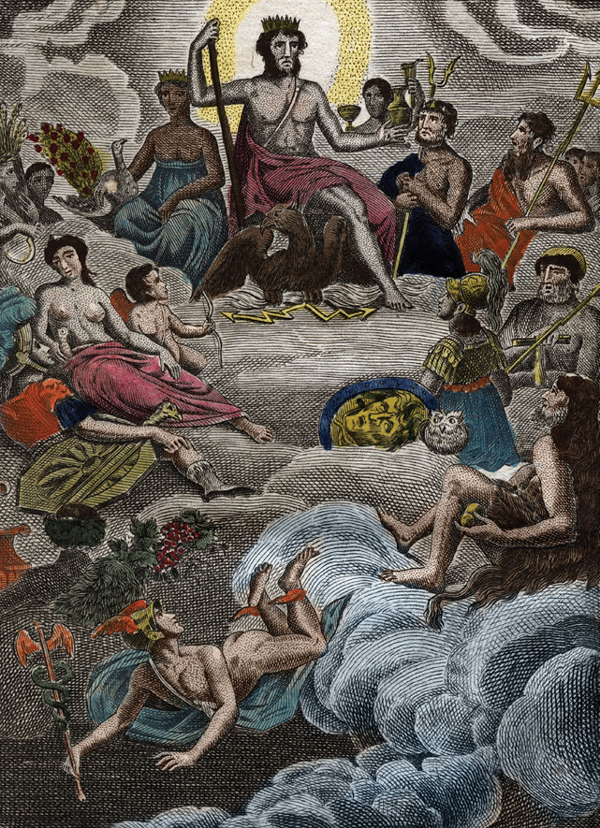
Illustration representing the 12 Olympian gods and various onlookers. Leemage/Universal Images Group/Getty Images
G reek mythology is the body of stories concerning the gods, heroes, and rituals of the ancient Greeks. That the myths contained a considerable element of fiction was recognized by the more critical Greeks, such as the philosopher Plato in the 5th4th centuries BCE . In general, however, in the popular piety of the Greeks, the myths were viewed as true accounts. Greek mythology has subsequently had extensive influence on the arts and literature of Western civilization, which fell heir to much of Greek culture.
Although people of all countries, eras, and stages of civilization have developed myths that explain the existence and workings of natural phenomena, recount the deeds of gods or heroes, or seek to justify social or political institutions, the myths of the Greeks have remained unrivaled in the Western world as sources of imaginative and appealing ideas. Poets and artists from ancient times to the present have derived inspiration from Greek mythology and have discovered contemporary significance and relevance in Classical mythological themes.
T HE H OMERIC P OEMS : THE I LIAD AND THE O DYSSEY
The 5th-century- BCE Greek historian Herodotus remarked that the Greek poets Homer and Hesiod gave to the Olympian gods their familiar characteristics. Few today would accept this literally. In the first book of the Iliad, the son of Zeus and Leto (Apollo, line 9) is as instantly identifiable to the Greek reader by his patronymic as are the sons of Atreus (Agamemnon and Menelaus, line 16). In both cases, the audience is expected to have knowledge of the myths that preceded their literary rendering. Little is known to suggest that the Greeks treated Homer, or any other source of Greek myths, as mere entertainment, whereas there are prominent Greeks from Pindar to the later Stoa for whom myths, and those from Homer in particular, are so serious as to warrant bowdlerization or allegorization.
T HE W ORKS OF H ESIOD : T HEOGONY AND W ORKS AND D AYS
The fullest and most important source of myths about the origin of the gods is the Theogony of Hesiod (c. 700 BCE ). The elaborate genealogies are accompanied by folktales and etiological myths. The Works and Days shares some of these in the context of a farmers calendar and an extensive harangue on the subject of justice addressed to Hesiods possibly fictitious brother Perses. The orthodox view treats the two poems as quite different in theme and treats the Works and Days as a theodicy (a natural theology). It is possible, however, to treat the two poems as a diptych, each part dependent on the other. The Theogony declares the identities and alliances of the gods, while the Works and Days gives advice on the best way to succeed in a dangerous world; and Hesiod urges that the most reliablethough by no means certainway is to be just.
O THER L ITERARY W ORKS
Fragmentary post-Homeric epics of varying date and authorship filled the gaps in the accounts of the Trojan War recorded in the Iliad and Odyssey; the so-called Homeric Hymns (shorter surviving poems) are the source of several important religious myths. Many of the lyric poets preserved various myths, but the odes of Pindar of Thebes (flourished 6th5th century BCE ) are particularly rich in myth and legend. The works of the three tragediansAeschylus, Sophocles, and Euripides, all of the 5th century BCE are remarkable for the variety of the traditions they preserve.
In Hellenistic times (32330 BCE ) Callimachus, a 3rd-century- BCE poet and scholar in Alexandria, recorded many obscure myths; one of his contemporaries, the mythographer Euhemerus, suggested that the gods were originally human, a view known as Euhemerism. Apollonius of Rhodes, another scholar of the 3rd century BCE , preserved the fullest account of the Argonauts in search of the Golden Fleece.
In the period of the Roman Empire, the Geography of Strabo (1st century BCE ), the Library of the pseudo-Apollodorus (attributed to a 2nd-century- AD scholar), the antiquarian writings of the Greek biographer Plutarch, and the works of Pausanias, a 2nd-century- AD historian, as well as the Latin Genealogies of Hyginus, a 2nd-century- AD mythographer, have provided valuable sources in Latin of later Greek mythology.
A RCHAEOLOGICAL D ISCOVERIES
The discovery of the Mycenaean civilization by Heinrich Schliemann, a 19th-century German amateur archaeologist, and the discovery of the Minoan civilization in Crete (from which the Mycenaean ultimately derived) by Sir Arthur Evans, a 20th-century English archaeologist, are essential to the 21st-century understanding of the development of myth and ritual in the Greek world. Such discoveries illuminated aspects of Minoan culture from about 2200 to 1450 BCE and Mycenaean culture from about 1600 to 1200 BCE ; these eras were followed by a Dark Age that lasted until about 800 BCE . Unfortunately, the evidence about myth and ritual at Mycenaean and Minoan sites is entirely monumental because the Linear B script (an ancient form of Greek found in both Crete and Greece) was mainly used to record inventories.
Geometric designs on pottery of the 8th century BCE depict scenes from the Trojan cycle, as well as the adventures of Heracles. The extreme formality of the style, however, renders much of the identification difficult, and there is no inscriptional evidence accompanying the designs to assist scholars in identification and interpretation. In the succeeding Archaic (c. 750c. 500 BCE ), Classical (c. 480323 BCE ), and Hellenistic periods, Homeric and various other mythological scenes appear to supplement the existing literary evidence.

